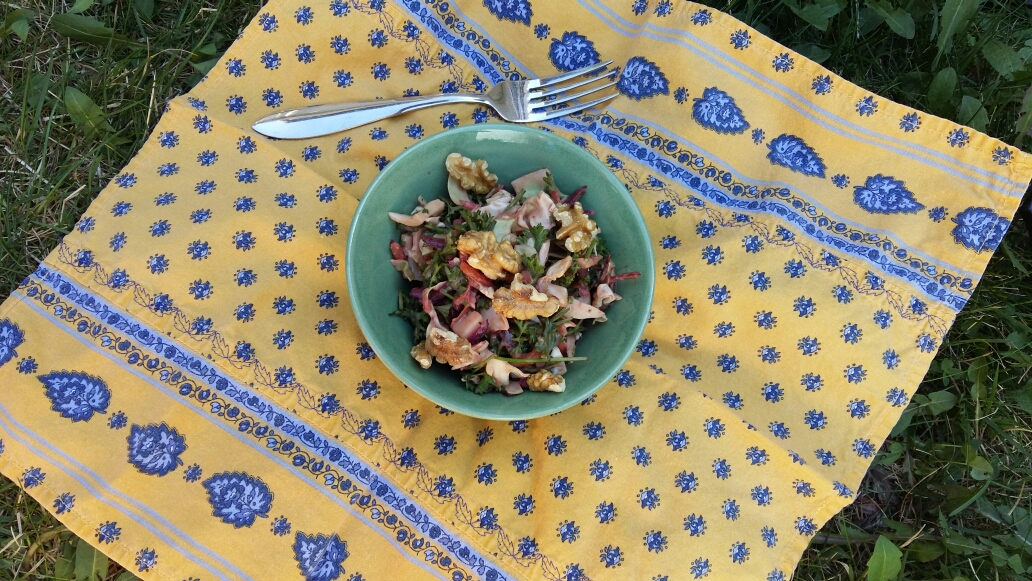I have a favorite new staple in the fridge this spring, an update of an old classic, like that mid-century modern armchair that sits among the new century suite, it's clean, crisp, and it makes you happy to see it day after day!
A twist on a picnic classic, inspired by getting to move my (home) office outside almost 2 months early this year, I was yearning for fresh, raw, crunchy ingredients. I wasn't thinking of coleslaw to make, the salad was inspired out of what I had in the fridge...It just ended up being a slaw. My recipes usually start this way, as I can't stand to "run to the store" for just one or two ingredients, I like to be inspired and challenged to make something delicious out of what I already have. This one came easy.
I started with the veggie crisper, spotting a green cabbage, some beets, carrots that I always have in the house, and a bunch of parsley that was intended to be a tabouli salad at some point. There are always some sort of nuts or seeds in my fridge as well, keeping these in the fridge helps preserves the essential fatty acids. The spotlight of the week was walnuts and chia seeds.
Another staple in the condiment door is an organic balsamic vinegar, some apple cider vinegar, a must have for salad dressing ease.
With an avocado hanging in the fruit basket I saw yumminess coming together perfectly, I didn't know until I tasted it how yummy it would be, but the mix of ingredients pointed towards exactly what I was after!
For the full recipe CLICK HERE but first I want to discuss the health benefits of this amazing salad.
Cabbage is boring to some but amazing to me!
Cancer prevention tops all other areas of health research with regard to cabbage and its outstanding benefits. More than 475 studies have examined the role of this cruciferous vegetable in cancer prevention. It is most shown to have the highest benefits from raw cabbage, second best would be lightly steaming it.
Given the roles of oxidative stress and chronic inflammation as risk factors for cancer, the antioxidant and anti-inflammatory richness of cabbage would provide anti-cancer health benefits even without cabbage's glucosinolates.Glycosides are bitter sulfur-containing compounds that when hydrolyzed (chewed), form bioactive compounds including some which are anticarcinogenic. Glucosinolates are cabbage's high card with regard to "anti-cancer" benefits. The glucosinolates found in cabbage can be converted into isothiocyanate compounds that are cancer preventive for a variety of different cancers, including bladder cancer, breast cancer, colon cancer, and prostate cancer.
High in K, C, B6, magnesium, and fibre, it's a hit at under 44 cal/ cup.
Parsley
Parsley is rich in many vital vitamins, including Vitamin K, C, A, B6, and iron, along with other essential trace elements. This means parsley keeps your immune system strong, tones your bones and heals the nervous system. It helps flush out excess fluid from the body, thus supporting kidney function, and studies have shown eating it on a regular basis can help control blood pressure.
Parsley is a good source of folic acid (B6), one of the most important B vitamins. While it plays multiple roles in the body, one of its most critical is in relation to cardiovascular health is its necessary involvement in the process through which the body converts homocysteine into less harmful molecules.
Parsley's oils, particularly myristicin, has been shown to activate the enzyme glutathione-S-transferase, which helps attach the molecule glutathione to oxidized molecules that would otherwise do damage in the body, otherwise known as an antioxidant. The activity of parsley's volatile oils qualifies it as a "chemoprotective" food, and in particular, a food that can help neutralize particular types of carcinogens like the benzopyrenes that are part of cigarette smoke and charcoal grill smoke on foods.
1 Cup is only 22 cals, and meets all of your vit C and A needs for the day.
Beets
Beets are high in immune-boosting vitamin C, fiber, and essential minerals like potassium;
essential for healthy nerve and muscle function, along with manganese; good for your bones, liver, kidneys, and pancreas. Beets also contain the B vitamin folate, which helps reduce the risk of birth defects.
Betanin and vulgaxanthin are the two best-studied betalains from beets, and both have been shown to provide antioxidant, anti-inflammatory, and detoxification support. The detox support provided by betalains includes support of some especially important Phase 2 detox steps involving glutathione.
Beets contain a lot of great things, including phytochemicals like quercetin and resveratrol. But the positive effects of beets on exercise performance are probably due to their nitrate content, and no, the nitrates from processed foods will not give you the same benefits, I'm talking about the small amounts of naturally occurring nitrates. Studies have shown that beetroot juice improves time to exhaustion during exercise (in other words, you have more energy for a longer period) and reduces the oxygen cost of exercise.
Beet greens are also a valuable source of lutein/zeaxanthin (extremely healthy for the eyes) One cup of raw beet greens may contain over 275 micrograms of lutein! Beet roots are not nearly so concentrated in lutein, but high in carotene, so go ahead and eat it all!
1 cup is equal to "2 servings of vegetables" and only 75 cal.
Walnuts and Chia or whatever
Nuts
Not only do they have high quality protein content, they are also packed with healthy fats that are essential to a wholesome diet. High in Vitamin E, omega 3 fatty acids, and very rich in antioxidant levels, these are a common theme among the foods that are best as immune system guards.
Adding nuts and seeds to a meal add the healthy proteins and fats that will help balance your blood sugars throughout the day. For more information on balancing blood sugars, click here.
Enjoy the abundance of nature, and the weekend folks!
